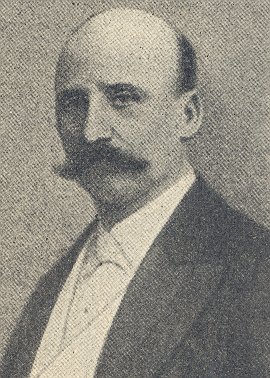Roberto Galli ( 1840-1931 )

Roberto Galli was an Italian politician and journalist.
He was born on December 28, 1840, in Chioggia, in north-eastern Italy; the city was then part of the Austrian Empire. His father was a teacher of literature in high schools in the Veneto region. Influenced by his family environment, from an early age Roberto pursued the study of ancient history, art history and architecture. He studied Law at the University of Padua and qualified as a notary public.
In the early 1860s he actively participated in the movement for the liberation of his homeland from the Austrians and its integration into the newly established Italian state – an objective achieved in 1866. This experience prompted him to abandon the notary’s career and pursue a career in journalism. In 1869 he founded in Venice the daily newspaper Il Tempo, which he ran until 1890. In his newspaper’s columns, he passionately advocated the democratic ideals but also stressed the need to continue the struggle for the territorial expansion of Italy to Trento, Trieste and Dalmatia, which were then under Austrian rule.
He was elected an MP for the first time in 1886 and, except for the 1897–1900 period, remained a member of the Italian Parliament until 1919, when he retired from politics. In his parliamentary career, he distinguished himself as an orator and became particularly active in foreign policy debates, maintaining the view that Italy should play a major role in the Mediterranean and the Balkans. From December 1893 to March 1896, he served as State Secretary for the Interior in the government of Francesco Crispi.
With the outbreak of the 1897 Greco-Turkish War, Galli became one of the most prominent supporters of Greece. He championed the establishment of a philhellenic front to encourage the Italian government to adopt a favourable attitude towards Greek interests. He sought to facilitate the intervention of the major European Powers in Greece in the conflict with the Ottoman Empire, and by extension in the settlement of the Cretan question, in a way favourable to the Greek side.
In the following years, his interest in Crete-related developments continued unabated. In his addresses to the Italian Parliament and articles in the Italian Press, he supported the island’s unification with Greece. He maintained a firm philhellenic stance during the Balkan Wars (1912–1913), which resulted in the doubling of the size of the Greek territories, including Crete. Excited by this development, Galli sent a congratulatory telegram to the first Cretan Governor General, Loukas Kanakaris-Roufos, ahead of the ceremony for the annexation of Crete to Greece: “For more than 30 years now, I have supported the unification of heroic Crete with the motherland, Greece. I will therefore join the solemn ceremony tomorrow with an enthusiastic soul.”
In recognition of the services he rendered to Greece, the City of Athens made him an honorary citizen and the Greek government awarded him the Order of the Redeemer (Grand Commander).
He died in Bergamo on February 19, 1931.




